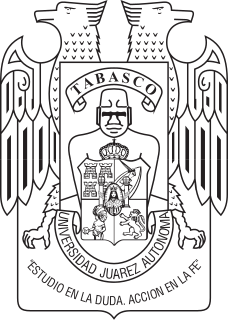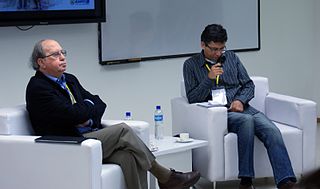
The National Autonomous University of Mexico is a public research university in Mexico. It is consistently ranked as one of the best universities in Latin America, where it's also the biggest in terms of enrollment. A portion of UNAM's main campus in Mexico City, known as Ciudad Universitaria, is a UNESCO World Heritage site that was designed by some of Mexico's best-known architects of the 20th century and hosted the 1968 Summer Olympic Games. Murals in the main campus were painted by some of the most recognized artists in Mexican history, such as Diego Rivera and David Alfaro Siqueiros. With acceptance rates usually below 10%, UNAM is also known for its competitive admission process. All Mexican Nobel laureates are either alumni or faculty of UNAM.

The Ibero-American University is a Mexican private institution of higher education, sponsored by the Society of Jesus. In 2009, the UIA received the SEP-ANUIES Prize as the best private university in Mexico. The Ibero's flagship campus is located in the Santa Fe district of Mexico City. It is ranked by QS World University Rankings as 701-750 worldwide and 7 in Mexico.
Education in Mexico has a long history. Indigenous peoples created institutions such as the telpochcalli and the calmecac. The Royal and Pontifical University of Mexico, the second oldest university in the Americas, was founded by royal decree in 1551. Education in Mexico was, until the early twentieth century, largely confined to males from urban and wealthy segments and under the auspices of the Catholic Church.
Mireille Roccatti Velásquez, is a Mexican scholar and jurist who served as the first female president of the country's National Human Rights Commission.

María Lavalle Urbina was a Mexican lawyer and politician who served as the first female president of the Mexican Senate.
Axel Didriksson Takayanagui is a writer, a professor at Universidad Nacional Autónoma de México (UNAM) and member of the board of the UNESCO Chair on Regional Integration and University at the Autonomous University. He is also the coordinator between the Instituto Internacional para la Educación Superior en América Latina y el Caribe and the UNESCO Chair, as well as the director of the Center of Studies at the University (CESU).
Miguel Angel Escotet is a social scientist, education administrator and author, emeritus professor at the University of Texas at Brownsville, of which he was dean of the College of Education. He was also secretary general of Organización de Estados Iberoamericanos and professor at Florida International University. He is since 2014 director general of corporate social responsibility of Abanca. He is also president of Fundación Galicia Obra Social, Afundación, and president of IESIDE, Afundacion's business school.

Universidad Juárez Autónoma de Tabasco is a public institution of higher learning located in Villahermosa, Tabasco, Mexico. The mission of the university is "to prepare professionals with broad and deep expertise in their area of study to fill the needs of Tabasco and the country at large." UJAT is the largest and most prominent university in the state of Tabasco. During the 2007-2008 academic year the university enrolled 35,271 students and had a teaching staff of over 2,000. For the same school year the university offered bachelor's degrees in 36 disciplines, master's degrees in 26 areas, three doctoral degrees, and post-graduate Certificates (Especialidades) in 17 graduate areas of specialization. The university grants law, education, management, engineering, medicine, architecture, nursing, and dentistry degrees, plus some 30 additional degrees in other fields of study.
The Ibero-American Summit, formally the Ibero-American Conference of Heads of State and Governments, is a yearly meeting of the heads of government and state of the Spanish- and Portuguese-speaking nations of Europe and the Americas, as members of the Organization of Ibero-American States. The permanent secretariat in preparation of the summits is the Ibero-American General Secretariat (SEGIB).
Intercultural bilingual education(Educación bilingüe intercultural) is a language-planning model employed throughout Latin America in public education, and it arose as a political movement asserting space for indigenous languages and culture in the education system. IBE is designed to address the educational needs of indigenous communities, and consists of various bilingual curriculum designs.
María Ángeles Ferrer Forés is a Spanish music education pedagogue and musicologist, awarded the Premio Acción Magistral 2010 by UNESCO, as best professor of Spain. Her books, discs, and interactive software for young students and teachers are published in Spain by Pearson Education and Oxford University Press. She is member of the organization and Jury in Ibiza International Piano Competition.

Jesús Martín-Barbero was a Spanish-Colombian communication scientist.
Cecilia Braslavsky was an Argentine educator, pedagogue, and author. She served as Director-General of Educational Research in the Argentine Ministry of Education and Director of UNESCO's International Bureau of Education.

Universidad Iberoamericana León is a private, Catholic, Jesuit university campus located in Leon, Guanajuato, Mexico, which was founded in 1978 as a campus of Universidad Iberoamericana to extend its reach to the state of Guanajuato and the Bajio region. It is now independently run from the Mexico City campus and it is part of the Mexican Jesuit University System.

The Iberoamerican University Torreón is a private university located in the city of Torreón. It belongs to the Jesuit University System (SUJ) and the Association of Universities Entrusted to the Society of Jesus in Latin America. The Iberoamerican University Torreón was founded in 1982 and has a student population of 1732 students. It offers 16 bachelor's degrees (licenciaturas), 7 master's degrees and one doctorate. Located at Torreón, Coahuila, it has extension centres in the cities of Saltillo and Monterrey.
The Instituto Nacional para la Educación de los Adultos (INEA) is a decentralized public organization of the Mexican federal public administration, grouped in the sector coordinated by the Ministry of Education Public, with legal personality and its own patrimony, created by presidential decree on August 31, 1981.
Intercultural Universities in Mexico are higher education institutions which were established in 2004 in response to the lack of enrollment of the indigenous population in Mexico. While an estimated 10% of the population of Mexico is indigenous, it is the least represented in higher education. According to estimates, only between 1% and 3% of higher education enrollment in Mexico is indigenous. In response to this inequality, the General Coordination for Intercultural and Bilingual Education at the Ministry of Education established Intercultural Universities with the active participation of indigenous organizations and academic institutions in each region. These institutions are located in densely indigenous areas and, though they allow for diversity in enrollment, they are especially intended for the indigenous population. Founded on the principle of intercultural education, they aim to foster dialogue between different cultures and represent a way of responding to both the historical and more recent demands of indigenous peoples.
Larissa Adler Lomnitz was a French-born Chilean-Mexican social anthropologist, researcher, professor, and academic. After living in France, Colombia, and Israel, she received Chilean nationality by marriage and Mexican nationality by residence. She conducted research and studies regarding the way in which marginalized classes survive in Latin America. She pioneered the study of social networks and the study of the importance of trust for the economy and politics. Her first study in this regard focused on the exchange of favors in the Chilean middle class. Lomnitz completed her doctoral thesis about the importance of exchanging favors and confidence in the informal economy in Mexico City. She then explored the importance of social networks in very diverse fields: scientific communities, the Mexican upper class, and the teaching profession in Chile, among others. She wrote more than 70 chapters in books, nine books, and various popular articles for magazines.
Sylvia de Neymet Urbina was a Mexican mathematician, the first woman to earn a doctorate in mathematics in Mexico, and the first female professor in the faculty of sciences of the National Autonomous University of Mexico (UNAM).







